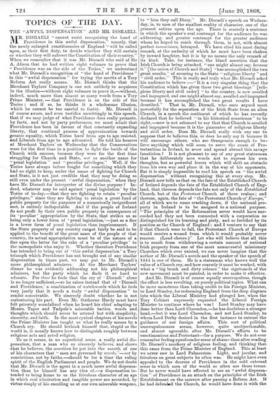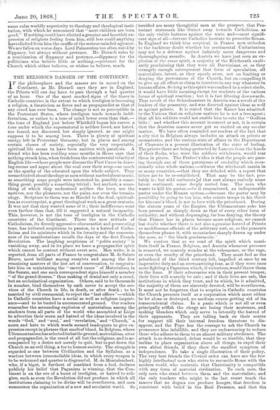TOPICS OF THE DAY.
THE "AWFUL DISPENSATION" AND MR. DISRARLI.
B. DISRAELI "cannot resist recognizing the hand of .1.11 Providence in this awful dispensation," namely, that the newly enlarged constituencies of England "will be called upon, as their first duty, to decide whether they will sustain or whether they will subvert the Constitution of their country." When we remember that it was Mr. Disraeli who said of Sir A. Alison that he had written eight volumes to prove that "Providence was on the side of the Tories," we understand what Mr. Disraeli's recognition of "the hand of Providence" in this "awful dispensation" for trying the merits of a Tory Reform Act really means. Mr. Disraeli thinks that the Merchant Taylors' Company is one not unlikely to acquiesce in the illusion—without eight volumes to prove it,—without, indeed, much more than almost as many words from a Tory Prime Minister, — that Providence is on the side of the Tories ; and if so, he thinks it a wholesome illusion, which he cannot be too careful to foster. Mr. Disraeli is of course aware, and even testifies unwittingly in this speech, that if we may judge of what Providence does really promote, by facts, and not by party preferences, we must admit that Providence has been in favour of that constantly expanding liberty, that continual process of approximation towards greater equality, which Tories have' from age to age resisted, and Liberals from age to age advocated. He told his hearers at Merchant Taylors' on Wednesday that the Conservatives were for the first time in a position to fight the battle of the Church with success, because they were for the first time struggling for Church and State, not as another name for "penal legislation" and "peculiar privileges." Well, if the Tories have always before fought for something which they had no right to keep, under the name of fighting for Church and State, is it not just credible that they may be doing so still even under the present "awful dispensation," when they have Mr. Disraeli for interpreter of the divine purpose ? In- deed, whatever may be said against penal legislation' by the Tories of to-day—that they are fighting to retain "peculiar privileges," since they are fighting to retain a great fund of public property for the purposes of a numerically insignificant sect, is entirely indisputable. And if the people of Ireland do not profit by their own public property in consequence of its 'peculiar' appropriation by the State, that strikes us as being only a lower form of penal legislation,'—just as a fine is a lower form of penal legislation than imprisonment. If the State property of any country canpot fairly be said to be applied to the benefit of the great mass of the people of that country, its actual appropriation must be of the nature of a fine upon the latter for the sake of a 'peculiar privilege' to the monopolists who enjoy it. Whether therefore Providence has intended to bring out of 'this awful dispensation' a Tory triumph which Providence has not brought out of any similar dispensation in times past, we may put to Mr. Disraeli's more philosophical admirers. At the Merchant Taylors' dinner he was evidently addressing not his philosophical admirers, but the party which he finds it so hard to educate. For these he feels that the cry of 'Disraeli' alone is no longer sufficient,—so he raises instead that of Disraeli and Providence,' a combination of watchwords which he feels very justly that it needs a truly "awful dispensation" to render conceivable. We sincerely doubt whether he is not caricaturing his part. Even Mr. Gathorne Hardy must have felt privately scandalized when he heard his chief adapting to Messrs. Taper and Tadpole's miserable tactics, words and thoughts which should never be uttered but with simplicity, sincerity, and faith. In the most cynical chapters of his novels the Prime Minister has taught us what he really means by a Church cry. He should bethink himself that, stupid as the world is, it usually knows how to distinguish roughly between religious acts and acted religion.
To us it seems, in no superficial sense, a really awful dis- pensation, that a man who so sincerely believes, and shows dhat he believes, the assertion he put into the mouth of one of his characters that "men are governed by words,"—not by convictions, not by faiths,—should be for a time the ruling spirit of the English Parliament and people. We do not doubt that Mr. Disraeli is the agent in a much more awful dispensa- tion than he himself has any idea of,—a dispensation in- tended to bring home to us the frivolous character of an age in which real admiration and tangible power are accorded, by virtue simply of his excelling us at our own miserable weapons, to "him they call Dizzy." Mr. Disraeli's speech on Wednes- day, is, to men of the smallest reality of character, one of the grossest satires upon the age. There is scarcely a sentence in which the speaker's real contempt for the audience he was addressing, and greater contempt for the greater audience whom he hoped to reach through them, is not, with almost perfect insouciance, betrayed. We have cited his most daring remark, at the audacity of which he must have been shaken by inward laughter, but it is by no means the only remark of its kind. Take, for instance, the bland assertion that the Irish Church is being attacked, "one might almost say, because it" [the union of Church and State] "has accomplished the two great results," of securing to the State "religious liberty " and "civil order." This is really and truly what Mr. Disraeli asked his audience to believe :—" It is a very singular thing that the Constitution which has given these two great blessings" [reli- gious liberty and civil order] "to the country, is now assailed and impugned, and one might almost say, assailed and impugned. because it has accomplished the two great results I have described." That is, Mr. Disraeli, who once argued most powerfully for the separation of the Irish State from an alien Church, in a speech the sentiment of which he has recently declared that he believed "in his historical conscience" to be right,—now is not ashamed to say that that Church is assailed. and impugned because it is the guarantee of religious liberty and civil order. Does Mr. Disraeli really wish any one to suppose that he believes this, or does he only say it because it will encourage others, who are Orangemen enough to be- lieve anything which will seem to serve the cause of Pro- testantism in Ireland, to avow and spread abroad this savage fanaticism ? It is not pleasant to say of any great statesman that he deliberately uses words not to express his own thoughts, but as powerful levers which will shift an obstacle from his own way and place it in the way of his opponents. But it is simply impossible to read his speech on "the awful_ dispensation" without recognizing this at every step. Mr. Disraeli now tells us that on the fate of the Established Church. of Ireland depends the fate of the Established Church of Eng- land, that thereon depends the fate not only of the Established Church, but of the Protestant Church of these realms ; and thereon, again, the fate of "the Protestant Church of Europe," all of which are to come crashing down, if the national pro- perty in Ireland is to be assigned to a national purpose.. "The principles of the Reformation never would have suc- ceeded had they not been connected with a corporation so distinguished for its learning and piety, and so fortified by its position as the Church of England ; and I venture to say that if that Church were to fall, the Protestant Church of Europe would receive a wound from which it would probably never recover. (Loud cheers)" Let who will believe that all this is to result from withdrawing a certain amount of national Irish property from one of the most unsuccessful missionary Churches which ever existed, we can never imagine that the author of Mr. Disraeli's novels and the speaker of the speech of 1844 is one of them. He is a statesman who knows well the value of a Church cry, and how coarsely it must be worked, with what a "big brush and dirty colours" the signboards of the new movement must be painted, in order to make it effective.
And Mr. Disraeli is of course equally unscrupulous, though the effect. is less revolting, on purely political topics. What can be more monstrous than taking credit to his Foreign Minister, to Lord Stanley, for redeeming England from the deep disgrace into which the Liberal Ministry had plunged her, when the Tory Cabinet expressely requested the Liberal Foreign Minister to continue where he was ? Lord Stanley may have done better than Lord Clarendon,—he has doubtless a stronger head,—but it was Lord Clarendon, and not Lord Stanley, to whom Lord Derby desired in the first instance to entrust the guidance of our foreign affairs. This sort of political unscrupulousness seems, however, quite unobjectionable, and almost agreeable, after Mr. Disraeli's efforts to be sanctimonious and Protestant—for a purpose. We do not ever remember feeling aprofounder sense of shame than after reading Mr. Disraeli's mockery of religious feeling, and thinking that this came from the Prime Minister of England. This at least we never saw in Lord Palmerston. Light, and jocular, and frivolous on great subjects he often was. He might have even appealed to the decrees of Providence in the cold external sense in which men of the world so often use those terms. But he never would have affected to see an "awful dispensa- tion" of Providence in an attack on the principles of the Irish Establishment on the morrow after passing a Reform Act. If he had defended the Church, he would have done it with the same calm worldly superiority to theology and theological insti- tution, with which he announced that "most children are born good." If nothing could have elicited a genuine and heartfelt ex- pression of religious feeling from him, still less could anything have elicited from him the snuffle of the serious-minded agitator. We are fallen on worse days. Lord Palmerston too often ruled by flippancy, but always without pretence. Mr. Disraeli rules by a combination of flippancy and pretence,—flippancy for the politicians who believe little or nothing,—pretence for the Church which either believes, or wishes to believe, much.



































 Previous page
Previous page